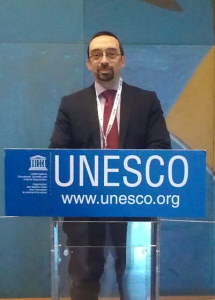UNIR presents its view of OER and MOOCs challenges at the UNESCO Global Policy Forum
Paris, France. The Global High Level Policy Forum: “Online, Open, and Flexible Higher Education for the Future We Want”, organized by UNESCO (www.unesco.org) and ICDE (www.icde.org) has been addressed by leaders on Education from all over the world.
For UNIR, it has been an opportunity to share its vision about eLearning participating on the action plan elaboration that is going to be part of the education agenda for the next 15 years basis. The objective was to design an agenda to guide government actions to face the current educational challenges, and to ensure equitable, quality education and lifelong opportunities for all.
The Global Policy Forum has been organized by United Nations Educational, Scientific and Cultural Organization (UNESCO) in partnership with International Council for Open and Distance Education (ICDE), at the UNESCO Headquarters, Paris, in June 9-11, 2015.
The World leaders in Education, including over 150 policy makers, scholars, members of NGOs, researchers and other stakeholders, have discussed and delivered an agreement to implement a best practice framework for Higher Education, which highlights equity, access, flexibility, affordability, engagement, student access and quality.

Daniel Burgos, Vice-chancellor for Research and Technology (UNIR Research, http://research.unir.net), UNESCO Chair on eLearning (http://unesco-elearning.unir.net), and ICDE Chair in Open Educational Resources (http://www.icde.org) presents the analysis by UNIR Research about nine challenges for Open Educational Resources in Higher Education. In addition to Accreditation, Credit Recognition and Educational Methodology, the necessary focus on Competence-based courses, require a commitment amongst the various stakeholders before an effective integration into official academic programmes is feasible.
The organizers distributed a position paper before the conference, based on an online survey followed by over a hundred experts of fifty three countries. Prof. Burgos has highlighted that «it means a great support for our strategic vision about Educational Technology, and our implementation plan, since almost every challenge addressed by the report on ICT in Education is currently implemented by UNIR».
Furthermore, Prof. Burgos, has highlighted that this report “strengthen our work line, and afford us to contribute actively to the debate on this forum with a future vision based on our experience to the date”. (http://bit.ly/MOOCsbackbone).
Education Agenda 2030
This forum built its conclusions on recent declarations about the future of education, and the education targets in the sustainable development goals supported by Qingdao Declaration and Incheon Declaration.
These reports will guide specific actions for the next 15 years to foster access and equity in education, along with lifelong opportunities for all through the effective and pedagogical use of ICT.
The conclusions from the Paris meeting are focused on a call for actions, at local, regional and National levels, and on the elaboration of clear and specific roadmap to come into specifics.
